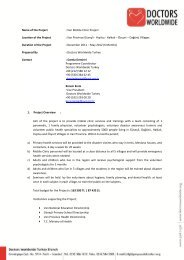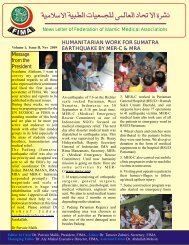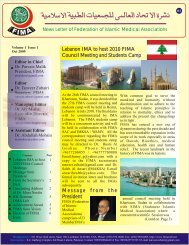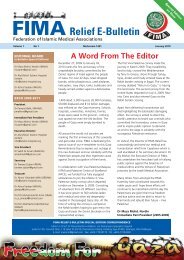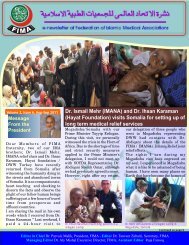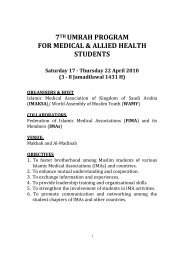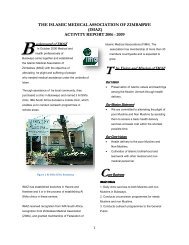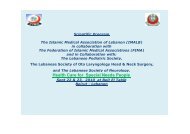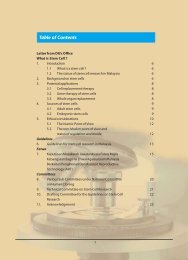FIMA Year Book 2009 - Federation of Islamic Medical Associations
FIMA Year Book 2009 - Federation of Islamic Medical Associations
FIMA Year Book 2009 - Federation of Islamic Medical Associations
Create successful ePaper yourself
Turn your PDF publications into a flip-book with our unique Google optimized e-Paper software.
Ethics <strong>of</strong> Clinical Researchis preferable for a married woman toobtain her husband’s consent. (20) Nosuch point is included in the CIOMSguidelines.Guideline 17. Pregnant Women asResearch SubjectsResearch involving pregnant womenis complicated by the fact that it maypresent potential benefits and risksto two beings; the woman and herfetus. However, pregnant womenshould be presumed to be eligiblefor participation in biomedicalresearch as long as they are adequatelyinformed about the benefits and risksto themselves, their pregnancies, theirfetuses, their subsequent pregnanciesand their fertility. The research shouldbe relevant to the particular healthneeds <strong>of</strong> pregnant women in general.Investigators should include in theirprotocols a plan to monitor theoutcome <strong>of</strong> the pregnancy with regardto both the health <strong>of</strong> the woman andthe short- and long-term health <strong>of</strong> thenewborn.<strong>Islamic</strong>ally, there is no objection tothe participation <strong>of</strong> pregnant womenin biomedical research because <strong>of</strong> thepotential benefit to them and to theirfetuses that can be derived from suchresearch. Ideally, before enrollingpregnant women in biomedicalresearch, the investigators should ruleout any harm to the fetus. Howeverthat is almost impossible to achieve.The safety <strong>of</strong> new medications can notbe assumed from animal experimentsor from the study <strong>of</strong> the pharmacology<strong>of</strong> the used medication. There willalways be some risk. <strong>Islamic</strong>ally,accepting the possibility <strong>of</strong> such harmwould nevertheless be permissible ifthe mother or the fetus is likely to gainan absolute or outweighing benefit.When there are potential risks for thefetus, even when they are minor oroutweighed, the investigator shouldalso obtain the consent <strong>of</strong> the father.This is not a requirement <strong>of</strong> the CIOMSguidelines. It states “..it is desirable inresearch directed at the health <strong>of</strong> thefetus to obtain the father’s opinion also,when possible.” (20)In some instances, the clinical trials aremeant for the treatment <strong>of</strong> the fetus andnot the mother. In these cases there aremore risks to the mother without anybenefit to her. In my opinion the mostobvious example is in utero (prenatal)fetal surgery to correct a fetal birthdefect. In these cases, the maternalinstinct may unduly influence herto agree to such trials. Ethically and<strong>Islamic</strong>ally, the investigators shouldmake an extra effort to explain the trial,the potential benefit to the fetus and thepotential complications in the neonatalmanagement, the short and long termprognosis for the fetus/neonate/childand especially the short- and long-termcomplications for the mother beforeshe agrees to participate in the trial.Safeguards should be established toprevent undue inducement to pregnantwomen to participate in the researchfor the sole benefit <strong>of</strong> the fetus. In thesecircumstances I recommend that theethics review committee establishes a<strong>FIMA</strong> <strong>Year</strong><strong>Book</strong> <strong>2009</strong>148




